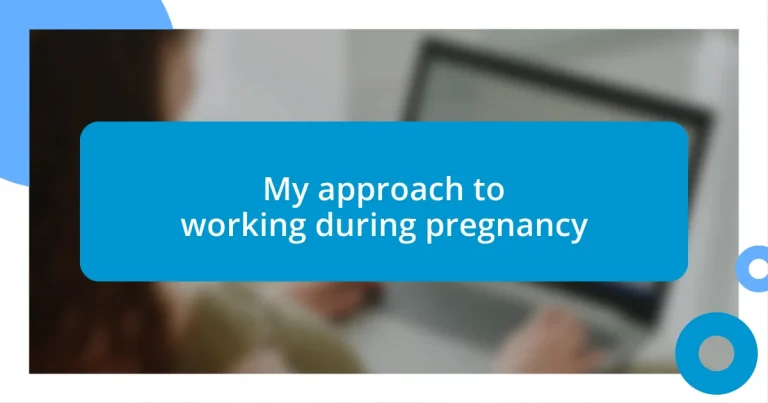Key takeaways:
- Establishing a routine with regular breaks and journaling can help manage stress and enhance focus during pregnancy.
- Open communication with employers about needs and expectations fosters a supportive work environment, improving overall well-being.
- Setting realistic work goals and prioritizing tasks can alleviate stress and maintain productivity while adapting to changing energy levels.
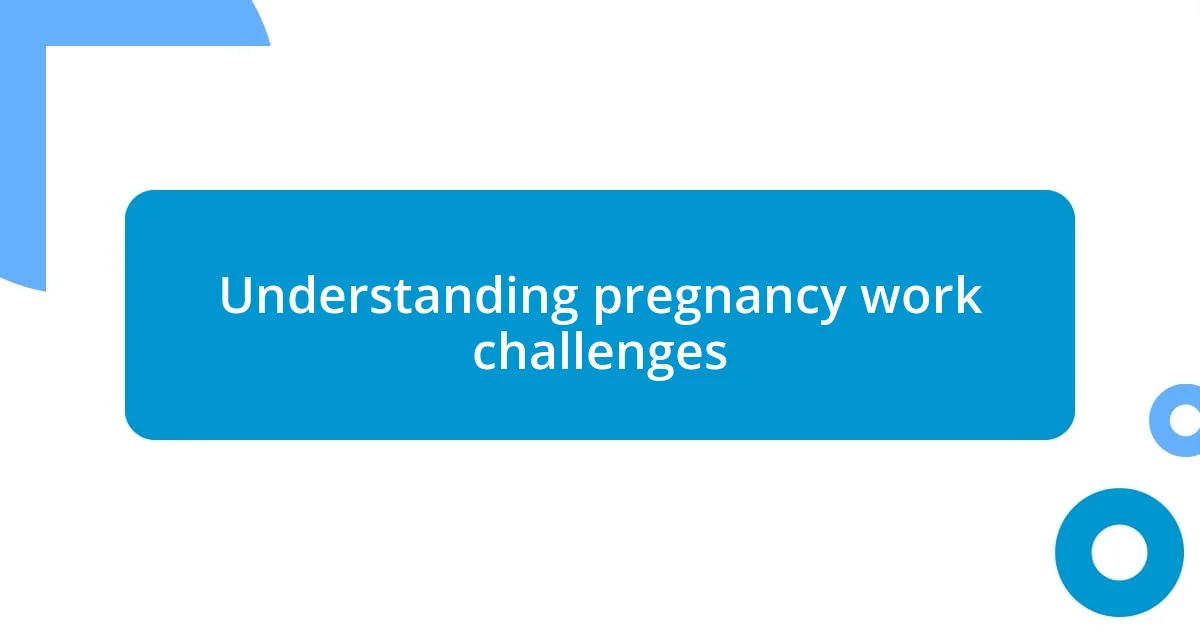
Understanding pregnancy work challenges
Pregnancy brings a unique set of challenges in the workplace that can feel overwhelming. I remember those days when I just couldn’t concentrate, battling fatigue and nausea while trying to meet deadlines. It raises the question—how do you navigate a bustling work environment when your body is shifting in ways you’ve never experienced before?
One aspect I found particularly tough was the physical discomfort that often came with long hours at my desk. There were moments when I would shift in my chair, struggling to find a comfortable position. Does this resonate with you? Maybe you’ve felt those same backaches or the need to get up and walk around more frequently, only to feel guilty about stepping away from your work.
Also, there’s the emotional rollercoaster that can affect how you interact with colleagues. Have you ever bristled at what would normally be harmless comments, like someone asking if you’re “eating for two”? I certainly did. That tension between maintaining professionalism and managing personal feelings can create an atmosphere of stress, making it vital to find strategies that work for you during this special time.
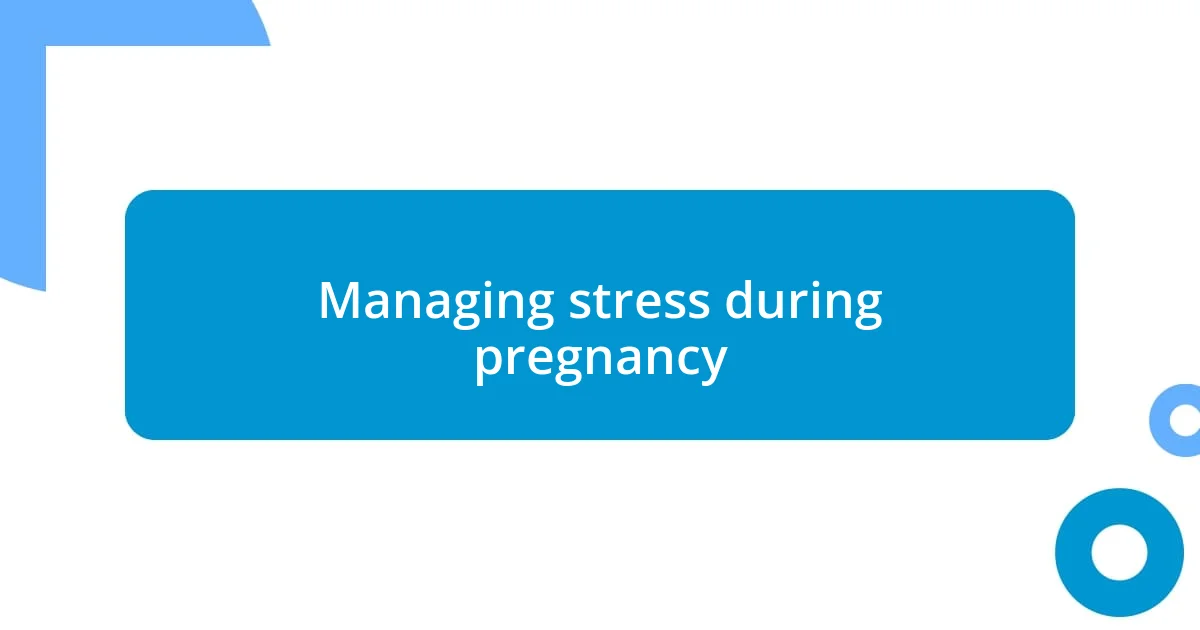
Managing stress during pregnancy
Managing stress during pregnancy can be quite the balancing act. From my experience, one effective method was establishing a regular routine that included short breaks to breathe and stretch. Honestly, just stepping away from my screen for five minutes to take deep breaths or walk around really helped clear my mind and reduce any anxiety building up.
I also found that journaling could be a powerful tool to manage stress. Writing down my thoughts and feelings provided me with a safe space to process any worries about work and motherhood. It’s fascinating how putting pen to paper can transform overwhelming emotions into manageable insights. Have you ever tried journaling? It might surprise you how reflective moments can shift your perspective and ease your stress.
Lastly, connecting with others who understand the journey can help alleviate pressure. I remember having coffee breaks with a colleague who was also pregnant. Sharing our experiences and laughter made the challenges feel less isolating. Building a supportive network, whether it’s colleagues or friends, truly lightened the emotional load, allowing me to handle work-related stress with greater ease.
| Stress Management Techniques | Description |
|---|---|
| Regular Breaks | Short intervals to step away and breathe or stretch to clear the mind. |
| Journaling | Writing thoughts and feelings to process worries and gain insights. |
| Supportive Connections | Engaging with colleagues or friends to share experiences and lighten emotional burdens. |
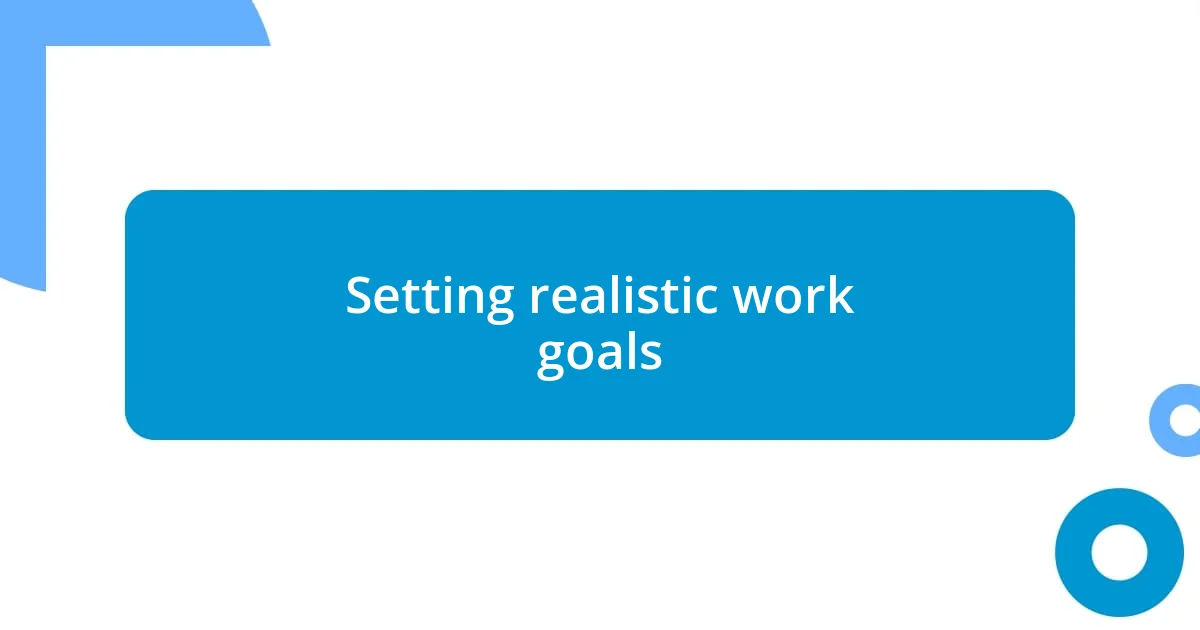
Setting realistic work goals
Setting realistic work goals during pregnancy is essential for maintaining both productivity and well-being. Personally, I learned to adjust my expectations based on my energy levels and overall comfort. There were days when I could tackle ambitious tasks and others when even simple assignments felt monumental. Recognizing that it’s okay to have these fluctuations allowed me to prioritize and set attainable goals, helping to prevent that overwhelming sense of dread that can creep in when facing an extensive to-do list.
To set more realistic work goals, I recommend evaluating the following:
- Energy Levels: Assess how you’re feeling each day and adjust your tasks accordingly.
- Time Management: Break larger projects into smaller, manageable steps to avoid burnout.
- Communication: Don’t hesitate to express your needs with your team. Sharing your situation can foster understanding and support.
- Flexibility: Allow room for adjustment. Life changes rapidly during pregnancy, and your work goals should too.
- Self-Compassion: Be kind to yourself. It’s perfectly normal to experience variations in productivity, and acknowledging that can ease pressure.
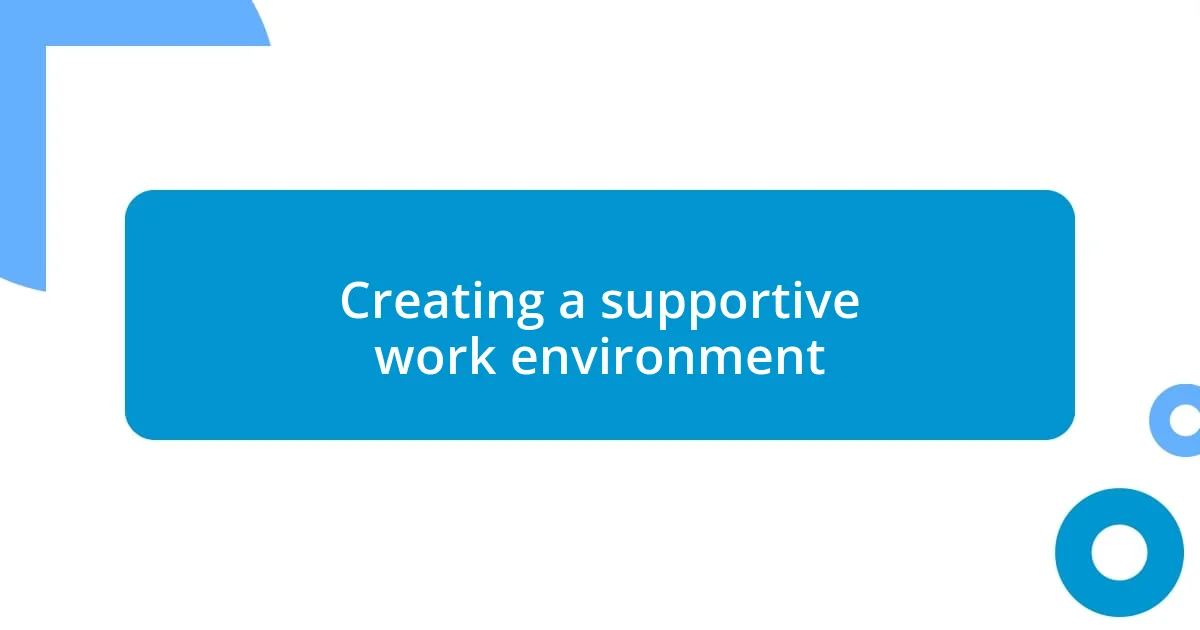
Creating a supportive work environment
Creating a supportive work environment is crucial during pregnancy, as it can significantly impact both mental and physical well-being. I remember when my workplace organized “wellness days.” These were designated times everyone could take a break without guilt, allowing pregnant employees like me to rest. Having that understanding created a space where the pressure eased, and I felt more empowered to manage my workload. Wouldn’t it be wonderful if all companies incorporated such initiatives?
Communication played a pivotal role in my experience, too. I decided to have an open conversation with my manager about my needs and challenges. To my surprise, not only did they appreciate my honesty, but they also made necessary adjustments to my role, leading to a more accommodating workload. It’s interesting how a single conversation can foster such a positive ripple effect through the work environment. Have you considered how simply talking to your supervisor could enhance your experience?
Moreover, promoting a culture of empathy can lead to a more supportive workspace. When colleagues showed genuine concern for my well-being, it made a world of difference. I fondly recall a team member who would regularly check in on me, offering to help with tasks or just share some encouraging words. That kind of support can uplift a pregnant employee’s spirit immensely, creating a bond that goes beyond just work. How can a small act of kindness change someone’s day? In my case, it was transformative.
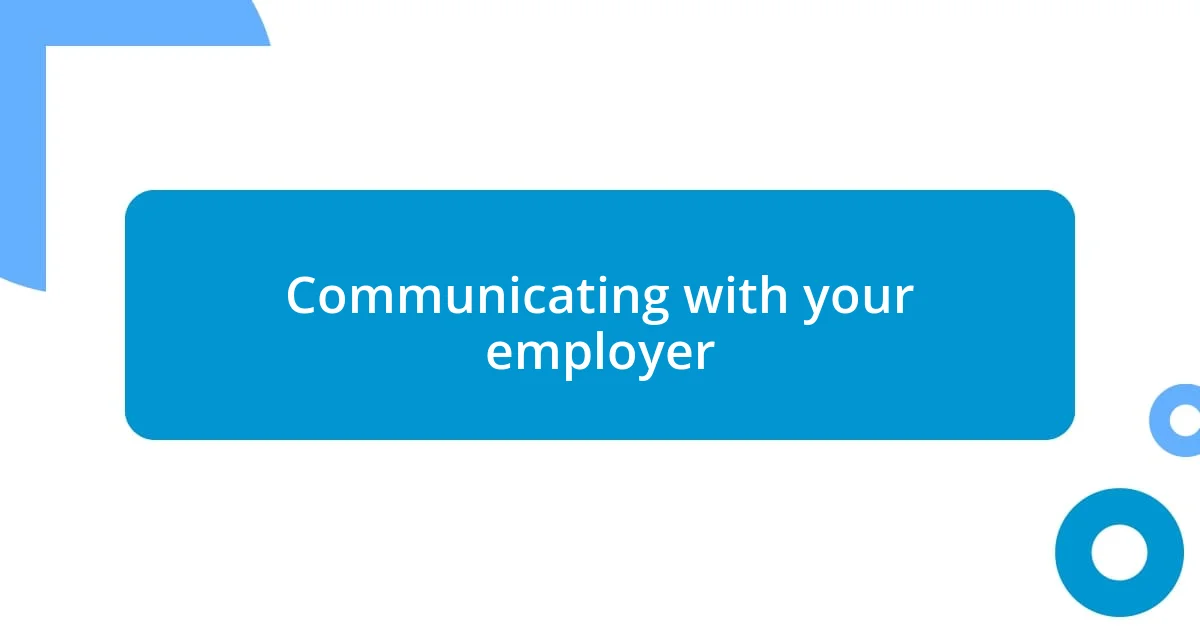
Communicating with your employer
Communicating honestly with your employer is critical during pregnancy. I remember when I first broke the news to my boss; I was nervous, wondering if they’d see me differently. What surprised me was their genuine concern and willingness to accommodate my needs right from that conversation. It’s essential to create an open dialogue so that your employer understands your unique situation and supports you through it.
As the pregnancy progressed, I made it a point to regularly check in with my manager. This proactive approach not only kept them updated but also reinforced a sense of teamwork. I didn’t want them to feel blindsided by any potential challenges that could arise. Has anyone ever told you that consistent updates can foster trust? I can attest to this; keeping that line of communication open made a world of difference in how we collaborated on projects.
Sometimes, it’s the little things that can shift your experience at work. For instance, after discussing my needs with my employer, I was granted flexible hours, which allowed me to maintain my productivity without overexerting myself. It felt amazing to have that understanding, making me wonder how many other parents might also benefit from such arrangements. Being open about my situation impacted not just me, but it also created a more compassionate work culture that I truly appreciated.
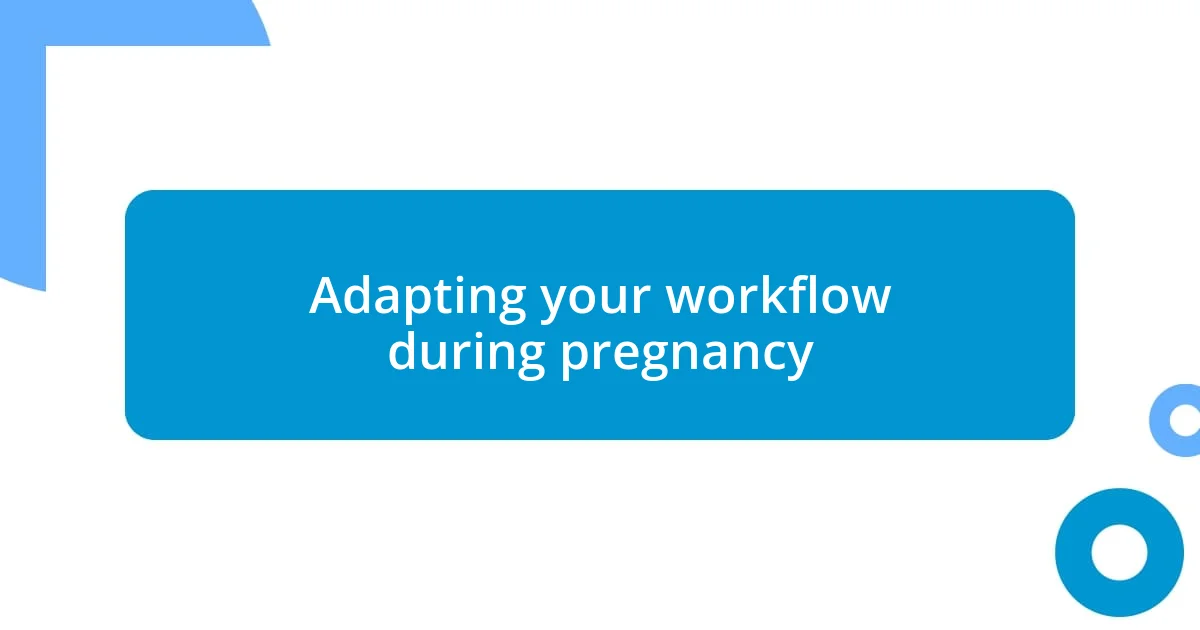
Adapting your workflow during pregnancy
Adapting your workflow during pregnancy requires flexibility and self-awareness. I remember adjusting my work hours to fit my energy levels, especially during the first trimester when fatigue hit hard. Those early mornings were a struggle, but I found that starting my day later allowed me to be more productive and focused. Have you thought about how small tweaks, like adjusting your schedule, could enhance your productivity?
Another key adjustment I made was prioritizing tasks. During pregnancy, I learned to embrace the idea of focusing on what truly mattered for the day. I began listing my top three priorities each morning, which helped alleviate that overwhelming feeling that comes from managing numerous responsibilities. This approach not only reduced my stress but also made me feel accomplished, even on days when my energy waned. How satisfying is it to wrap up a workday and know you tackled the most important items?
Lastly, collaborating with my colleagues became essential during my pregnancy. Sharing responsibilities lightened my workload. I set up regular brainstorming sessions, allowing team members to contribute ideas while I guided discussions. This not only fostered teamwork but also cultivated a supportive environment where I felt valued. Isn’t it amazing how collaboration can transform the work dynamic, especially in challenging times? That connection made all the difference for me, proving that adapting our workflow is truly a team effort.
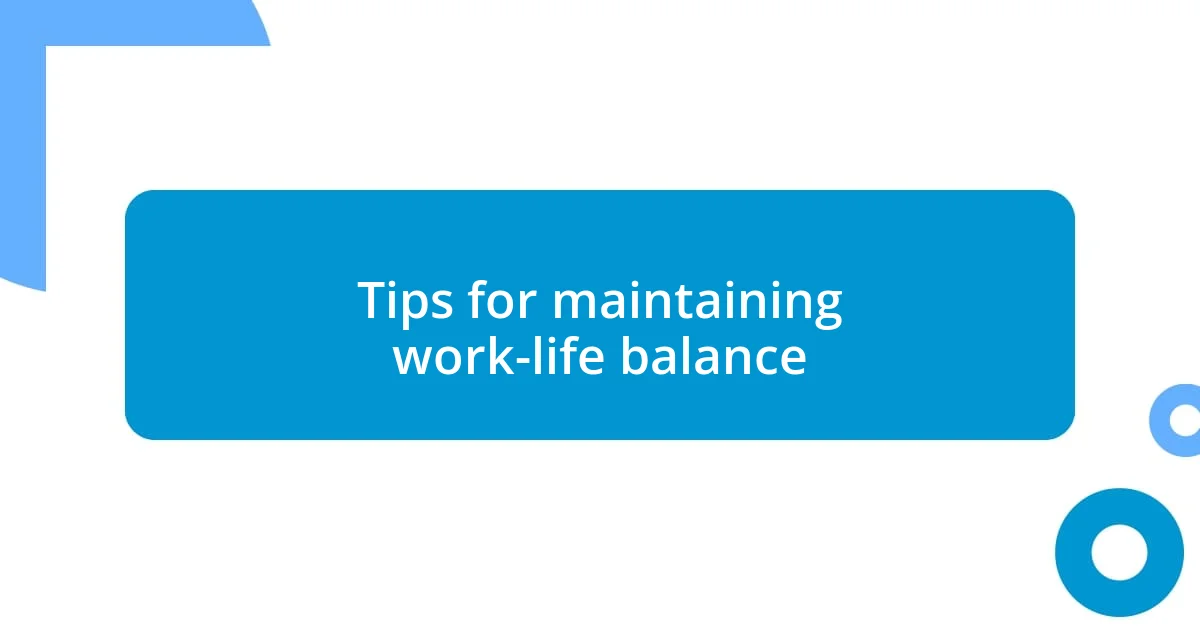
Tips for maintaining work-life balance
Maintaining a healthy work-life balance during pregnancy is essential, and I’ve discovered a few strategies that truly helped me along the way. One thing I started doing was setting clear boundaries between work and personal time. Initially, I found myself checking emails late into the evening, but that quickly became overwhelming. I soon realized that designating specific “off hours” not only protected my mental space but also allowed me to fully embrace my personal life and prepare for the changes ahead. Isn’t it empowering to reclaim those moments for yourself?
Another tip that worked wonders was planning enjoyable activities outside of work. For me, prioritizing time for self-care and relaxation became non-negotiable. A simple weekly ritual, like creating a cozy environment for a movie night or indulging in a soothing bath, helped me recharge. It was a clear reminder that while work is important, nurturing my well-being is crucial for maintaining productivity. Have you tried something similar? Carving out that personal time can truly uplift your spirits, don’t you think?
Lastly, I found it beneficial to regularly check in with myself about how I felt in both my work and personal life. Journaling became a vital practice for this reflection. By jotting down my feelings and thoughts, I gained insights into what was working and what needed adjustment. It was like having a personal wellness check-in. This simple habit helped me strike the right balance, ensuring that I was not only thriving at work but also fully embracing the joy of impending motherhood. How often do you take a moment to listen to your own needs? It’s a small but powerful practice that can lead to meaningful changes.












